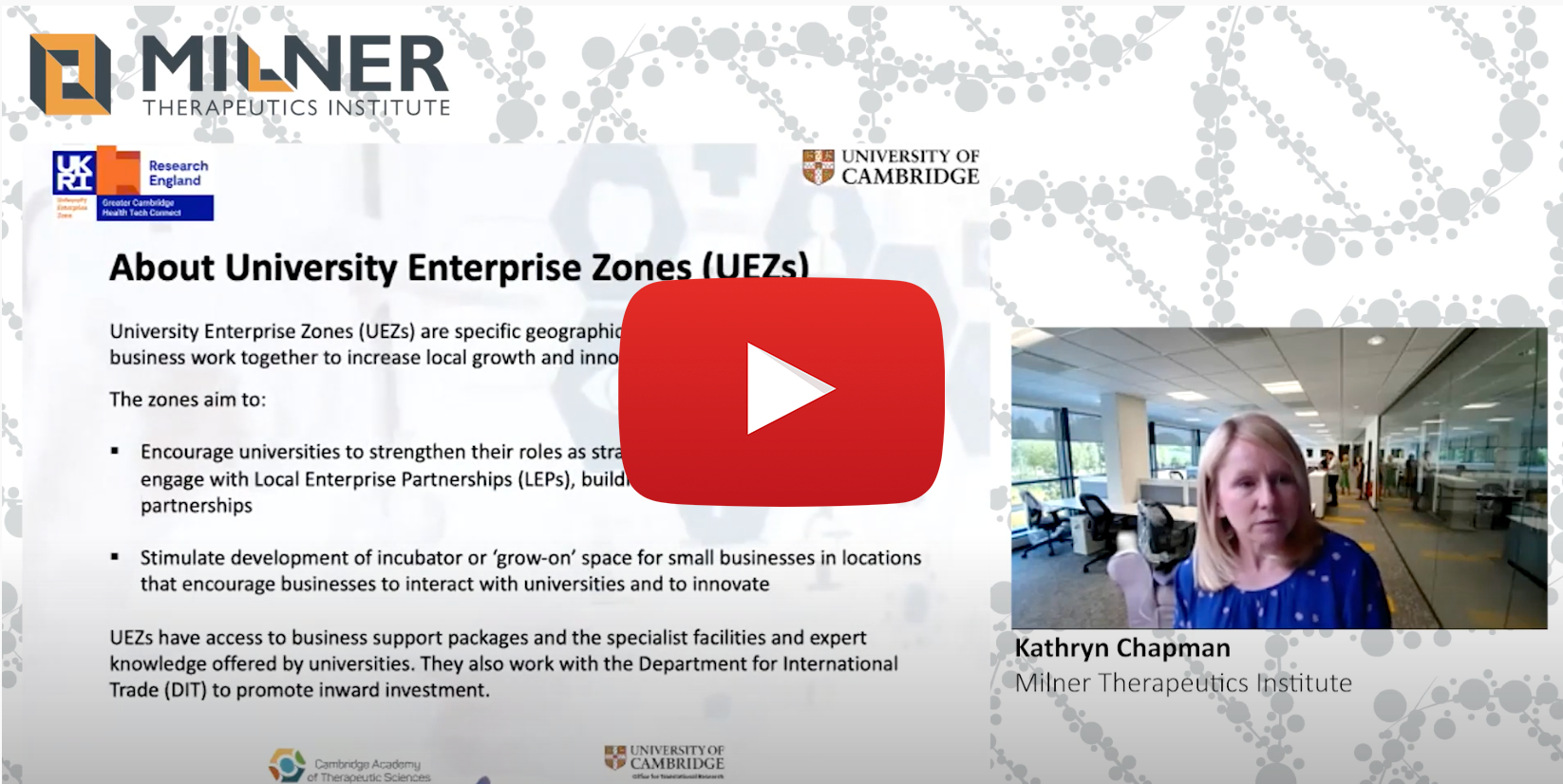| |

Over 200 attendees joined together for the AI medicine and novel drug target discovery workshop last week. The event was co-hosted by the Milner Therapeutics Institute and Yonsei University College of Medicine
|
| |
 |
|
Milner Update: March 2021
|
|
|
|
|
| |
The Milner team has been growing over the past few months and we are delighted to welcome both Mary-Jane Roebuck, our new Events and Communications coordinator, as well as April Foster, who will be working in the Centre for Pathway Analysis with our Head of Target Discovery Rebecca Harris.
During lockdown, we have been grateful to develop new ways to work with our international partners. Last week we hosted an AI medicine and novel drug target discovery workshop online together with Yonsei University in South Korea, which brought together more than 200 attendees from academia and industry over three days.
We are also particularly excited to announce a new pre-competitive collaboration which has been set up through the Milner Therapeutics Consortium to investigate autophagy targets in neurodegeneration. This is the first such project to bring together multiple academic groups across the University and Babraham Institute to work with three of our pharma partner companies — Astex, Eisai and Eli Lilly and Company. Read more »
In this issue:
- Milner Therapeutics Symposium 2021
- Connect: Health Tech Update
- Consortium spotlight: Declan Jones, Ferring Pharmaceuticals
- Academic spotlight: Matthias Zilbauer
- Milner spotlight: Rebecca Harris
- New affiliated companies
- Affiliated company news
- Upcoming events
|
|
|
|
|
|
| |
 |
|
Milner Therapeutics Symposium 2021
|
|
|
|
|
| |
Registration is now open for the sixth Milner Symposium! After careful consideration we have decided to move the Milner Symposium fully online this year, and the event will take place on 22nd June.
We have been busy adapting the programme to maximize opportunities for making new connections. In addition to a fantastic programme of speakers, there will be interactive networking sessions and a forum for arranging individual meetings. Our aim is to bring scientific connections back to life, and help you use this platform as a springboard for initiating new collaborations.
Register here »

|
|
|
|
|
|
| |
 |
|
Connect: Health Tech Update
|
|
|
|
|
| |
The Milner Therapeutics Institute and strategic partners* are almost ready to launch a digital platform as part of the new University Enterprise Zone (UEZ) initiative, the new logo for which is here on the right. This key online tool will support interdisciplinary collaborations and interactions between a wide range of health-tech stakeholders. The platform will also showcase events from across the University and cluster and highlight active funding calls.
You can watch an introduction to this initiative below.
*Maxwell Centre, Office for Translational Research, Cambridge Academy of Therapeutic Sciences, Cambridge University Health Partners.

|
|
|
|
|
|
| |
 |
|
Consortium Spotlight
|
|
|
|
|
| |
Declan Jones
Ferring Pharmaceuticals
Role: Vice-President, Global Head of External Innovation & Scientific Licensing, Ferring Pharmaceuticals. We are a group of scientists tasked with finding exciting external scientific opportunities to strengthen Ferring’s drug discovery and development efforts.
Areas of current interest for Ferring: Ferring Pharmaceuticals is a leader in reproductive medicine and maternal health, and in specialty areas within gastroenterology/microbiome and uro-oncology. Within reproductive medicine we are exploring a range of therapies targeting male and female infertility, maternoembryonic cross talk and implantation. Ferring’s mission is to develop treatments to help people build families and live better lives and the company’s therapeutic expertise is key to working with external collaborators.
Key industry challenge for the field: We have seen significant progress made within Assisted Reproductive Technology (ART) for fertility treatments, but despite this people still face significant challenges in building a family. This is due to limitations in our scientific understanding, but in addition, millions of people around the world are unable to access the existing care, treatment and support they need. Our aim, via mechanisms such as the Milner Therapeutics Institute, is to access the best scientific collaborators to understand the basic biology of reproductive medicine and maternal health to find solutions to address these scientific challenges. In addition, we recently launched The Ferring #ProjectFamily Commitment to set out our commitment to building families of every shape and size. Our Commitment spans our work to research and develop new treatments, to expand access to IVF, to reduce stigma around fertility issues, and to advocate for everyone’s right to build a family.
Most exciting basic or clinical breakthrough in the past few years: I have been so excited by the way companies, universities, healthcare systems and governments came together during the current COVID-19 pandemic. The development of effective vaccines in months rather than years provides meaningful lessons about how to tackle other serious healthcare problems together. From a Ferring perspective, I am particularly excited by our microbiome program targeting recurrent Clostridioides difficile (C. diff) infection and new novel gene therapy approach for non-muscle-invasive bladder cancer.
Find out more about Ferring by visiting their website Click here »
|
|
|
|
|
|
| |
 |
|
Academic Spotlight
|
|
|
|
|
| |
Matthias Zilbauer
Department of Paediatrics, University of Cambridge
Honorary Consultant, Addenbrooke’s Hospital
Research focus: We are investigating human intestinal epithelial cell biology in healthy development as well as diseases such as inflammatory bowel diseases (IBDs). We are particularly interested in the role of epigenetic mechanisms (specifically DNA methylation) in regulating epithelial cell function and how aberrant epigenetic programming can lead to altered cellular function associated with disease.
Recent advance from the lab: Our laboratory uses human intestinal epithelial organoids as translational research tools. These can be generated from human intestinal mucosal samples (e.g. paediatric gut biopsies or fetal gut samples). Furthermore, we are subjecting both primary tissue and mucosa derived intestinal organoids to single cell RNA sequencing. Our recent findings have demonstrated in vitro maturation of human fetal gut organoids as well as re-activation of fetal-like transcriptional signatures in the intestinal epithelium of children newly diagnosed with Crohn’s Disease Elmentaite et al. Dev. Cell (2020) »
Key challenge for the field: Although impaired function of the intestinal epithelium has been proposed by many to play a key role in IBD pathogenesis, exact mechanisms are still poorly understood. Human intestinal epithelial organoids provide us with great opportunities to make some progress in this important area. However, the wide range of phenotypes and outcomes seen in patients diagnosed with IBD suggests that any given mechanism may only be present in a subset of individuals. Hence, large patient numbers are required which provides substantial challenges to any translational research studies and particularly those including the generation of human gut organoids.
Most exciting basic or clinical breakthrough in the past few years: Over the past eight years, our group has generated exciting evidence that stable, disease associated DNA methylation changes are present in the intestinal epithelium of children newly diagnosed with IBD. We are currently in the process of finding out to what extent these epigenetic changes impact on cellular function as well as their potential use as novel drug targets and treatment stratification.
Find out more about work in the Zilbauer group by visiting their website. Click here »
|
|
|
|
|
|
| |
 |
|
Milner Spotlight
|
|
|
|
|
| |
Rebecca Harris
Head of Target Discovery
Centre for Pathway Analysis,
Milner Therapeutics Institute
You previously worked in several research environments across academia and industry. What influenced your decision to join the Milner team?: I was attracted to the role specifically because of the Milner’s desire to build powerful partnerships between academia and industry, and to advance academic research to patient benefit. When I moved from academia to industry (over 15 years ago!) I did so because I wanted my research to have more of a “real world” impact. Prior to joining the Milner I had been working in a project management role within an academic setting. The work being carried out had huge translational potential and the PI involved was very focused on clinical relevance and impact. This really reignited my desire to be more scientifically involved in this field again.
How does this role at the Milner compare with your previous experience in industry and academia?: It’s been quite an interesting blend. The core Milner team is a really dynamic group, and we work very much with an industry mindset but within the context of the much wider setting of the University and its network. It’s great to be part of such an innovative team and to apply my experiences and insights from both fields. At the moment we are building the Milner’s own experimental research programme and scientific team. I’m really looking forward to developing this and using both my drug discovery experience, gained from my time at Ferring Research and Horizon Discovery, as well as skills I have learnt from being part of a start-up company to help grow a successful team.
How does the Onco-Innovation programme work across the cancer centre?: The Onco-Innovation programme focuses on pre-clinical research and engagement with industry, and we are fortunate to be able to leverage the industry network of the Milner Consortium. Through the Consortium, we have been able to link CRUK Cambridge Centre members to industry partners for 10 pre-clinical projects to date, spanning 6 different CRUK Cambridge Centre programmes. The Onco-Innovation programme is also developing its own research programme within the Milner Therapeutics Institute, through which we will be collaborating with different Centre researchers on target identification and functional validation projects. We are also expanding our research collaborations in artificial intelligence/machine learning, with a data set/analysis pump-prime call being launched by the Onco-Innovation programme later in the year.
What are some of the biggest challenges for the Onco-Innovation programme?: While pre-clinical research is our core focus, together with the CRUK Cambridge Centre we have recognised an opportunity to develop a more cohesive flow from oncology pre-clinical research to clinical studies and this is one of the exciting challenges that we are working to address.
What has been your most exciting development in the past few years: I would say joining the Milner, the opening of the research institute and having my second child – all of which rather coincided! Life doesn’t always go according to plan, but I was extremely fortunate that such a great role presented itself and that the team were so supportive. It was particularly exciting to return from maternity leave to a brand new building!
What would we most likely find you doing at the weekend?: Usually doing something messy with the kids (think mud, paint, baking!), going out for a walk or bike ride and spending time cooking.
Tell us a fact about you that most people wouldn't know: I honeymooned on the slopes of an active volcano in Costa Rica!
Find out more about Rebecca's work, or get in touch, by visiting our website. Click here »
|
|
|
|
|
|
| |
 |
|
New Affiliated Companies
|
|
|
|
|
| |
My Personal Therapeutics
 is a London-based biotechnology company offering cancer patients worldwide access to the personalised cancer therapeutics based on avatar technology pioneered at The Mount Sinai School of Medicine, New York.
is a London-based biotechnology company offering cancer patients worldwide access to the personalised cancer therapeutics based on avatar technology pioneered at The Mount Sinai School of Medicine, New York.
If you would like to find out more about becoming affiliated, email our Head of Partnerships and Alliance, Alison Schuldt: a.schuldt@milner.cam.ac.uk
|
|
|
|
|
|
| |
 |
|
Affiliated Company News
|
|
|
|
|
| |

 |
JW Pharmaceutical is cooperating with Voronoi, a bio-venture, to develop next-generation anticancer drugs. Read more »
|
 |
PolyProx Therapeutics has raised an additional £1 million seed financing from LifeArc to validate polyproxin® drug leads in oncology Read more »
|
 |
Camena Bioscience has announced they are expanding their presence at Chesterford Research Park. The new space will be used to build a super high throughput DNA synthesis facility Read more »
|
 |
Definigen has closed a £3.25 million funding round to accelerate its next phase of growth. Read more »
|
 |
Ubiquigent and the University of York have been awarded a UKRI grant to explore the potential of novel deubiquitylase (DUB) enzyme inhibitors to address neglected tropical diseases. Read more »
|
 |
Eurofins Scientific has announced the acquisition of Beacon Discovery, a drug discovery and contract research organization focused on G-Protein Coupled Receptor (GPCR) research. Read more »
|
 |
Abcam was announced as the recipient of the 2020 CiteAb Award for Antibody supplier succeeding in knockout (KO) validation. Read more »
|
 |
Active Motif has launched an end-to-end Hi-C service in partnership with Arima Genomics to investigate the three-dimensional folding patterns of the genome. Read more »
|
 |
Twist Bioscience announced it will supply the U.S. Centers for Disease Control and Prevention (CDC) with a customized version of Twist SARS-CoV-2 Synthetic RNA Controls for use in the CDC Influenza SARS-CoV-2 (Flu SC2) Multiplex Assay. Read more »
|
 |
Domainex has invested in the WAVEdelta instrument from Creoptix AG. to strengthen its capabilities in fragment-based drug discovery via its FragmentBuilder platform. Read more »
|
 |
Healx have partnered with Mission: Cure to launch a new Rate Treatment Accelerator programme. Read more »
|
 |
Benevolent AI announced that a novel chronic kidney disease (CKD) target identified through their AI platform has been advanced into the drug development portfolio at AstraZeneca as part of their ongoing collaboration. Read more »
|
 |
Eagle Genomics published a blog piece highlighting the Microbiome Strategy Roadmap, which has been led by the UK's KTN (Knowledge Transfer Network). Read more »
|
 |
Genome Biologics have initiated a research with AstraZeneca. Read more »
|
|
|
|
|
|
| |
 |
|
Events & Opportunities
|
|
|
|
|
| |
 |
Collaborating to Supporting Biotech and Med Tech Businesses across Our Neighbouring Regions
Tuesday 2nd March, 10-11am, Onine
Hosted by One Nucleus and Medilink Midlands, this event is focused on The East of England and The Midlands as significant regions in the UK Life Sciences & Healthcare field. All Life Science businesses are invited to this online session to understand their activities and what useful steps could be taken next. Read more »
|
 |
Cambridge New Therapeutics Forum (CamNTF) March Meeting
Thursday 4th March, 6-8pm, Online
The March meeting of the Cambridge New Therapeutics Forum (CamNTF) will be hosted by EMBL-EBI and will include three speakers from the Cambridge community: Dr Rebecca McIntyre (Wellcome Sanger Institute, Genomics of Inflammation and Immunity), Dr Gosia Trynka (Wellcome Sanger and Open Targets), and Dr Natalia Jimenez (Director, HPC, AI and Quantum Life Sciences CoE, Atos).
Read more »
|
 |
ELRIG: CRISPR in Drug Discovery 2021
23rd-24th March, Online
This event aims to bring together the research community working in the field of genome engineering with interests in developing and applying the technology for pharmaceutical research. Join scientists from academia, pharma, biotech and CRO’s online to hear talks given by speakers at the cutting edge of genome engineering, network at the virtual exhibition and gain strategic insights into solutions for increasing the success of drug discovery and development.
Read more »
|
 |
ELRIG: Translating ideas into therapies 2021
28th & 29th June, Online
This meeting aims to bring together the research community working in the field of new medicine creation with interests in developing their translational research ideas and applying novel technologies and means of collaboration to address critical clinical needs. Join scientists from academia, pharma, biotech and CRO’s either in person or online to hear talks given by speakers at the cutting edge of their field and gain strategic insights into solutions for increasing the success of your therapeutic ideas. Read more »
|
|
|
|
|
| |

